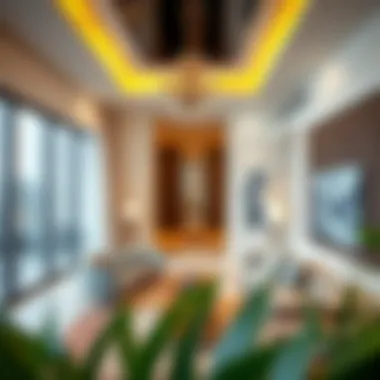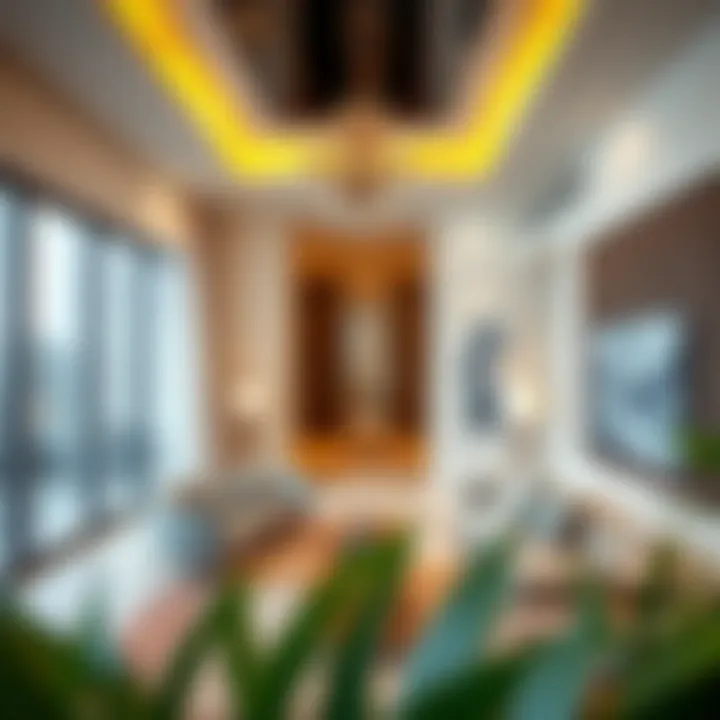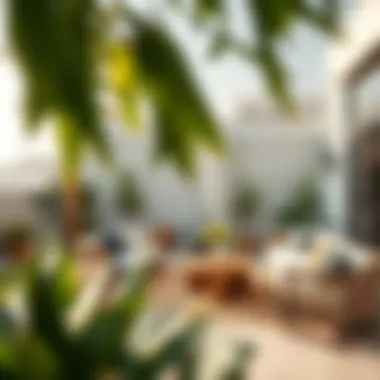Exploring Better Homes in Dubai's Real Estate Market


Intro
The real estate landscape in Dubai is vibrant and continuously evolving. Known for its opulence and futuristic architecture, the city also shifts with the winds of economic changes and demographic growth. This guide serves as a beacon for potential investors, renters, and anyone looking to navigate the intricacies of Dubai's housing market.
As someone considering a move or thinking about investing in property here, understanding the dynamics of this market proves essential. From pricing trends to emerging neighborhoods, each aspect warrants a keen eye to make the most informed decisions. In the following sections, we will delve deep into the intricacies of the market.
Market Trends
Current Real Estate Pricing
Dubai's real estate pricing has seen a significant transformation over the recent years. Prices for properties can fluctuate dramatically depending on various factors, including location, property type, and market demand. This city offers everything from luxurious villas in Palm Jumeirah to affordable apartments in areas like Dubai Marina or Business Bay. Many analysts observed that:
- Prices in prime locations tended to stabilize, indicating a shift toward a more sustainable growth trajectory.
- Metropolitan developments like the Expo 2020 site are driving interest in residential spaces within proximity.
In 2023, the average price per square foot varied widely. For instance, gated communities in developed districts still command premium prices, while many up-and-coming neighborhoods are providing ample opportunities for first-time buyers. To give you some context, the following statistics from Apex Properties can shed light on current pricing trends:
- Downtown Dubai: Average price per square foot is about AED 2,200.
- Dubai Sports City: The figure drops to AED 900 per square foot, attracting families and young professionals.
Emerging Neighborhoods and Developments
As the city continues to expand, new neighborhoods are sprouting up, promising fresh opportunities. Dubai Creek Harbour is gaining traction as a youthful alternative to well-established locales. It features waterfront living designed around a vibrant culture and leisure activities. Another neighborhood to keep an eye on is Jumeirah Village Circle (JVC), which offers a mix of community-style living at affordable rates.
The rising interest in these areas can be attributed to several factors:
- Accessibility: Improved transport links make commutes easier, opening up possibilities for remote employees and students.
- Amenities: Communities now boast parks, retail hubs, and schools, making them family-friendly.
Developments such as the Dubai Hills Estate are drawing attention too. Lauded for their luxurious offerings, these neighborhoods promise a blend of modern living blended with green surroundings. Not only do these places appeal to the local population but also to expatriates seeking a unique blend of luxury and comfort.
"As Dubai grows, so does its diversity in housing options. The key for buyers is to remain informed about the shifting sands of real estate. "
Investment Opportunities
Short-Term vs Long-Term Investment Strategies
Investing in Dubai's real estate can be akin to riding a roller coaster; exhilarating but requires knowledge. Short-term investors typically dive into the buy-and-flip model, capitalizing on the market's transformations. On the flip side, long-term investors often consider renting out properties for regular income, preferring established areas in light of steady demand.
A strategy buyers often mull is:
- Short-Term Investors: Focus on high-demand areas and renovations to resell fast.
- Long-Term Investors: Focus on buying in communities with growth potential and gradual appreciation, like Dubai Silicon Oasis.
Financing and Mortgage Options
Navigating financing in Dubai can be daunting without proper knowledge. The requirements for obtaining a mortgage are specific, particularly for expatriates. Most banks offer options, but they can differ:
- Local banks tend to offer favorable conditions for UAE residents but may present challenges for non-residents.
- International banks might cater to expatriates more comfortably but with higher interest rates.
It’s crucial to research and find mortgage options that work for your financial status. Understanding down payment requirements, which can range from 20% to 25% for foreign buyers, is essential.
For a smooth experience, potential buyers should consult with real estate experts and mortgage advisors.
Preamble to Better Homes
As the sun sets over the impressive skyline of Dubai, the term "better homes" resonates deeply within the city's pulsating real estate market. The phrase encapsulates more than just bricks and mortar; it signifies a lifestyle, a vision for what home should represent in a progressive and vibrant city. In this bustling metropolis, where traditional meets contemporary, understanding the elements that define a better home is crucial for potential buyers and renters.
The importance of this topic isn't merely academic. It encompasses the emotional and financial investments that individuals make in establishing their residential sanctuary. For expatriates, who make up a significant portion of the population, the search for a better home is especially poignant. They seek places that feel welcoming, reflecting their unique tastes, yet accessible amidst a hub of activity. Homeownership or renting in Dubai can be daunting, with various choices available, each riding on different trends, regulations, and vital lifestyle considerations.
In this article, we delve into criteria that make a home truly desirable. We will talk about location and accessibility, vital factors that affect everyday life, as well as design and aesthetics, which account for the emotional connection people feel toward their homes. Additionally, we will explore amenities that enhance living quality, making a property not merely a place to stay but a space where lives can unfold.
With current trends observing shifts towards sustainability and cultural tailored environments, it also becomes paramount to assess how these factors play into the concept of a better home.
"A house is made of walls and beams; a home is built with love and dreams."
In navigating Dubai’s real estate market, a prospective homeowner or renter needs to ask critical questions. What does a better home mean to them? Is it about proximity to the latest attractions, or is it a search for a tight-knit community feel? Is the focus on high-end designs or on practical living spaces? This introduction sets the foundation for assessing these ideals and the underlying factors that inform them. By comprehending these elements, one can make informed decisions that resonate well with personal aspirations and financial stability while investing in Dubai's exciting real estate.
From millennials seeking sprawling rooftops with stunning views to families wanting green spaces for children to play, the landscape of better homes in Dubai is as diverse as its population. The rest of this article promises a thorough examination of these aspects, equipping readers with insights for making choices in a market that's always on the move.
The Evolution of Dubai's Housing Market
Dubai's housing market has undergone remarkable changes over the past few decades, transforming it from a modest trading port to a global real estate hub. Understanding the evolution of this market is essential for anyone looking to invest, buy, or rent properties in this vibrant city. This understanding not only allows potential buyers to appreciate the current landscape but also to make informed decisions based on historical trends. A thorough analysis of the housing market can clarify how past events shape future opportunities.
Historical Overview
Dubai's journey began in the 1960s when oil was discovered, leading to swift economic development and urbanization. At that time, most people lived in simple homes, and there were few high-rise buildings. The groundwork for a modern city was laid when the Dubai government embraced visions for a future that would welcome global investors. Notably, the establishment of the Dubai Land Department in 1960 marked the beginning of organized real estate governance.
Subsequent decades witnessed a surge in development projects, each aiming more spectacular than the last. The late 1990s brought an influx of expatriates, which increased demand for housing. Residential developments like the Dubai Marina and Palm Jumeirah put the city on the map with awe-inspiring architecture and opulent living conditions.
Emerging regulations in the 2000s encouraged foreign investment by allowing expatriates to own properties in designated freehold areas. This was a game changer. The frenzy for luxury apartments and villas drove prices upwards, making real estate one of the most lucrative sectors.
The global financial crisis in 2008 shook the market, causing a sharp decline in property values and demand. However, the phoenix-like rise began just a few years later. Programs like the UAE's Golden Visa initiative further incentivized foreign investment, and today, the Dubai real estate market stands resilient, ready for its next chapter.
Current Trends in Real Estate
As of now, the Dubai real estate market is characterized by a mix of stability and innovation. A few key trends are shaping the landscape:
- Sustainable Developments: With global attention on climate change, eco-friendly homes are moving to the forefront. Developers are integrating green technologies, aiming for energy efficiency and minimal environmental impact.
- Emerging Neighborhoods: Areas like Dubai South and Dubai Hills Estate are gaining traction, appealing to both investors and renters seeking affordability alongside urban conveniences.
- Smart Technologies: Many new developments are incorporating smart home technologies, allowing for a seamless living experience. Features like home automation and security systems are becoming standard.
- Short-Term Rentals: Platforms like Airbnb have increased in popularity, encouraging property owners to explore short-term rental options. Coupled with an influx of tourists, this trend is shaping how properties are marketed and rented.
- Market Resilience: Amid geopolitical uncertainties, the Dubai real estate sector has shown adaptability, particularly with local demand counterbalancing global fluctuations.
As we can see, the evolution of the housing market in Dubai is a story punctuated by ups and downs, innovation, and adaptation to global trends. Investors, realtors, and prospective homeowners must pay attention to these currents to navigate effectively through this ever-changing landscape.
"Dubai's real estate is not just about bricks and mortar; it’s a mirror reflecting the ambitions of a global city."
For more insights, check out resources like Dubai Land Department or visit Wikipedia for a deeper dive into the history of Dubai's real estate.
Criteria for Defining a Better Home
Understanding what makes a home truly great is pivotal for anyone navigating the complexities of Dubai's real estate landscape. The criteria for defining a better home aren't just about aesthetics; they include practical elements that influence daily living and investment potential. Below, we delve into three major categories that buyers and renters should consider when evaluating their next dwelling.
Location and Accessibility
Location is often seen as the golden rule in real estate. Choosing the right neighborhood can significantly influence lifestyle and future property value. In Dubai, prime locations such as Downtown Dubai or Dubai Marina offer vibrant atmospheres filled with shopping, dining, and cultural experiences. These spots not only enhance quality of life but are also likely to retain or appreciate in value.
When assessing accessibility, it's vital to consider proximity to major transportation hubs like the Dubai Metro, which connects various parts of the city efficiently. In addition, being close to key services such as schools, hospitals, and supermarkets is a major plus. The ease of getting to work or leisure spots can make a world of difference, especially in a bustling metropolis where traffic congestion can be an issue.
- Consider proximity to:


- Metro stations
- Major highways
- Work and social hubs
In summary, a prime location paired with good accessibility can provide not just convenience but can be a significant factor in your investment decision.
Design and Aesthetics
Design is about more than just how a place looks—it's how it makes you feel. The architecture of a home should resonate with your personal style while providing comfort and functionality. In Dubai, architectural styles vary greatly, from contemporary designs with sleek lines to traditional Arabic influences. The choice largely depends on personal preferences and lifestyle.
Upon evaluating design, look for elements that enhance natural light and ventilation, such as large windows and open-plan layouts. Well-thought-out interiors also play a crucial role. Spacious rooms can feel more welcoming, providing flexibility in decorating and usability.
A beautiful home should not only be visually appealing but should also facilitate daily routines. The right design can make living more pleasant and even improve your daily productivity.
Amenities and Facilities
Amenities can elevate a living experience, turning a house into a home. In Dubai, houses or apartments that come with added perks like pools, gyms, and parks tend to be more desirable. For families, proximity to community facilities like playgrounds, schools, or even pet-friendly areas may tip the scales in favor of one property over another.
It's also wise to consider the operational aspects of these amenities—how well they're maintained and how frequently they are available for use. A property in a community that emphasizes these features shows that the developers care about the residents' quality of life.
- Popular amenities to look for:
- Swimming pools
- Fitness centers
- Green spaces
- Dedicated parking
Combining aesthetics, utility, good location, and top-notch amenities equals a solid investment in better homes in Dubai's market.
"Investing in a home goes beyond mere numbers; it's about quality of life and long-term satisfaction."
As potential buyers or renters navigate the seas of Dubai's housing market, understanding these criteria allows for more informed choices that can adapt to changing needs and aspirations.
Investment Opportunities in Dubai
Investment in Dubai's real estate market is not just about acquiring a property; it’s about seizing a golden opportunity in one of the world’s most dynamic cities. The appeal of Dubai lies in its exceptional growth potential, strategic location, and the luxury lifestyle it offers. Expanding into residential, commercial, and luxury developments presents diverse options that cater to a wide array of preferences and investment goals.
Understanding these investment opportunities is paramount for anyone considering making a move in this bustling market.
Residential Properties
Investing in residential properties in Dubai is akin to planting a seed in fertile ground. The city’s demographic is diverse, with both locals and expatriates keen on securing their own spaces. Popular neighborhoods like Dubai Marina, Downtown Dubai, and Jumeirah Lake Towers are constantly in demand, driven by their proximity to critical infrastructures such as schools, hospitals, and shopping districts.
When considering residential investments, it’s crucial to take into account factors such as:
- Rental Yield: Properties in prime locations can deliver impressive rental yields. Areas like Dubai Marina are known for consistently high returns.
- Market Trends: Understanding the current trends—like the rise of co-living spaces—can provide insights into what residential features are in demand.
- Future Developments: Being aware of upcoming projects can boost property values. For instance, the Expo 2020 site and its surrounding areas are expected to flourish in the coming years.
Commercial Spaces
Commercial properties can offer lucrative returns, making them a key component of an investment strategy in Dubai. As the city continues to thrive as a business hub, the demand for office spaces and retail outlets grows. Investing in locations like Business Bay or Dubai Silicon Oasis could yield returns that exceed traditional residential properties.
Factors to consider when entering the commercial space include:
- Business Environment: Assessing the economic climate and how it affects demand for different types of commercial real estate.
- Long-Term Leases: Unlike residential properties, commercial spaces often have longer lease durations, providing stability in cash flow.
- Market Positioning: Opting for spaces situated near transport links and other business infrastructures boosts attraction for tenants.
Luxury Developments
Dubai stands out globally for its luxury real estate market. Buyers in this segment are not just looking for a house; they are seeking a lifestyle wrapped in elegance and prestige. Developments on the Palm Jumeirah or in Downtown Dubai do not just represent homes, but rather symbols of success and opulence.
Key considerations in the luxury market include:
- Unique Features: Luxury properties often boast high-end finishes, exclusive amenities, and panoramic views which can substantially enhance their appeal.
- Brand Value: Investing in projects by renowned developers such as Emaar Properties or DAMAC can assure buyers of quality and a strong resale market.
- Demand from High-Net-Worth Individuals: Understanding the motivation of buyers in this segment can lead investors to the right properties that are likely to appreciate in value.
"Dubai's real estate market fascinates due to its combination of strong investment potential and luxury lifestyle offerings."
Understanding the Regulatory Framework
Navigating the waters of Dubai's real estate market can be like trying to find your way through a labyrinth, particularly for those unfamiliar with the local laws and regulations. Understanding the regulatory framework is essential for buyers, sellers, investors, and even renters to ensure that their transactions are both secure and beneficial. This framework lays the groundwork for property ownership, compliance, and the rights and obligations of all parties involved.
Knowing the ins and outs of the regulations related to property ownership significantly enhances an investor’s ability to make informed decisions. For expatriates, this knowledge is even more crucial; many may not be aware of the specific laws that apply uniquely to them. The regulations dictate everything from how property is bought and sold to the rights you have as a tenant. Misunderstandings or ignorance of these laws can lead to problematic situations down the line, such as disputes over ownership or unexpected fees.
In the bustling market of Dubai, the regulatory framework serves not only as a safety net but also as a guidepost. It can amplify the benefits of investing in real estate, such as favorable financing options and property appreciation, while also outlining potential pitfalls to avoid. With that in mind, let’s dive deeper into the specifics.
Property Ownership Laws for Expats
For expatriates looking to stake their claim in Dubai's property market, understanding ownership laws is a must. Traditionally, property ownership has been divided into freehold and leasehold areas. A freehold property is one where the buyer has full ownership of the property and the land it stands on, while leasehold properties are often those that are leased from the landowners for a period, usually up to 99 years.
Key points to consider for expats include:
- Freehold Areas: Expatriates can own property in designated freehold areas, such as Dubai Marina and Downtown Dubai. This ownership grants full rights over the property, making it a more attractive option for long-term investment.
- Leasehold Areas: For properties in leasehold areas, expats receive rights to use the property but do not own the land itself. This could create complications, especially when it comes to resale or inheritance.
- Buying Off-Plan: In Dubai, expats can also buy off-plan properties. However, it is essential to conduct due diligence on the developer and the project to mitigate risks associated with construction delays or legal disputes.
In terms of documentation, expatriates typically need to provide proof of income, identification, and potentially additional documentation, depending on the financial institution involved.
Real Estate Regulations and Compliance
Acquainting oneself with real estate regulations extends beyond mere ownership laws. It also includes understanding the compliance measures set forth by the Dubai Land Department and other governing bodies. Compliance ensures that transactions happen legally and transparently, minimizing the risk of fraud or misrepresentation.
Important regulations to keep in mind include:
- Registration and Fees: All property transactions must be registered with the Dubai Land Department, which typically involves various fees. Knowing these ahead of time can save buyers a headache and financial strain later.
- Broker Licensing: Real estate agents must possess a valid license to operate in Dubai. It’s advantageous for buyers and renters to work exclusively with licensed brokers as this guarantees a level of professionalism and adherence to industry regulations.
- Property Management Laws: If an investor decides to rent out their property, they need to familiarize themselves with tenant laws, especially regarding contracts and eviction rights. Understanding these laws protects landlords from potential disputes and helps in negotiating contracts.
"Thorough comprehension of the regulatory framework is not just a formality; it is a crucial step towards making a sound investment in Dubai's real estate landscape."
Equipped with a solid grasp of property ownership laws and compliance requirements, potential investors can approach the Dubai real estate market with confidence. By understanding the rules of the game, they can navigate challenges more effectively and capitalize on the vast opportunities that this dynamic market offers.
Real estate in Dubai is always evolving, and staying updated on regulatory changes is vital for anyone looking to make informed decisions in this vibrant environment. For further insights and updates, local authority websites such as Dubai Land Department provide useful resources and guidance tailored to both local and expatriate investors.
Market Analysis and Forecast
The realm of real estate is anything but stagnant, particularly in a dynamic city like Dubai. Understanding the market analysis and its subsequent forecasts can significantly steer investors, homeowners, and renters alike towards making informed and fruitful decisions. In this section, we will delve into current market dynamics and future projections to provide a comprehensive overview of what to expect in Dubai's housing landscape.
Current Market Dynamics
Dubai's real estate market is a kaleidoscope of opportunities and challenges. As of late, several factors are shaping the market's landscape. Key elements include:
- Supply and Demand: The balance between available properties and the people looking to buy or rent them is tight. In recent months, there has been a noticeable uptick in demand for residential properties, particularly those that offer a blend of comfort and affordability. High-rise apartments in neighborhoods like Dubai Marina and residential units in Jumeirah Village Circle are garnering a lot of interest.
- Regulatory Framework: The government has instituted new regulations designed to safeguard investors, ensuring a transparent process for property transactions. This boost in consumer confidence has led many to enter the market, thus driving certain price points up.
- Economic Indicators: Positive economic indicators such as increased foreign investments and a surge in tourism play a significant role in shaping the market dynamics. The influx of expatriates looking for better living arrangements enhances demand further.
"The essence of good real estate investment is not just about location but timing and market conditions as well."


The challenges, however, are prominent. Volatility in the market can lead to rapid fluctuations in property prices, making it crucial for buyers and investors to remain vigilant. This scrubbing of the market creates a need for solid research on prevailing pricing trends.
Future Projections
Looking forward, the forecast for Dubai's housing market appears optimistic, but caution is warranted. Experts anticipate:
- Price Stability: Following the initial surge in demand, a more stable price structure is expected as new developments come online. Investors should monitor these trends closely.
- Emerging Neighborhoods: Areas that have been quieter, such as Dubai Creek Harbour or Dubai South, are likely to see a rise in property values as development progresses. The government continues to encourage infrastructural advancements, making these neighborhoods attractive.
- Sustainable Development: With increasing importance placed on green buildings, future developments that adhere to sustainability norms will likely fetch higher interest and price points. Energy-efficient homes in planned communities are set to grasp the attention of not just local but international buyers as well.
Tips for Buyers and Renters
Navigating the bustling landscape of Dubai's real estate can feel like trying to fish in a barrel. Whether you’re looking to buy or rent, having the right insights can save you a world of hassle and ensure you don't just throw your money out the window. This section highlights essential tips that can empower buyers and renters as they embark on their property journey in this vibrant city.
Assessing Property Value
Determining the value of a property in Dubai's unique market isn’t exactly a walk in the park. It's wise to arm yourself with knowledge before diving in. Start by looking at recent sales figures in the area. Websites such as Property Finder and Bayut can offer invaluable insight into what similar properties are fetching. A general rule of thumb is to consider square footage, and compare it against asking prices in the neighborhood.
Another layer to consider is the condition of the property. Is it move-in ready, or will it require some TLC? Properties needing renovations usually come in lower on the pricing scale, but make sure to factor in repair costs when weighing your options. Also, keep an eye on the amenities that come with the property. A home with access to pools, gyms, and community parks can often command a premium price, but may save you money on future recreational costs.
When assessing property value, think about the potential for growth. Areas such as Dubai Marina or Downtown Dubai have historically shown solid appreciation rates. Understanding the trajectory of the market can provide invaluable insight into whether you're making a sound investment or just chasing a whim.
Negotiation Strategies
Once you’ve set your sights on a potential property, the next step is all about playing your cards right in negotiation. The first rule of thumb is to come prepared. Understanding the local market trends can bolster your position. Knowing whether it's a buyer's market or seller's market can influence how aggressively you negotiate.
Be clear about your budget and stick to it. It’s tempting to stretch your finances a bit further for that sleek apartment or beachfront villa, but temptation can lead to financial regrets down the road. When engaging with sellers or agents, express genuine interest, but keep a poker face on the price. If the listed price feels steep, don’t shy away from making a lower offer. The worst they can say is no, and in many cases, they’ll meet you halfway.
Utilize contingencies in your offer. These can protect you should the inspection reveal costly repairs or if financing falls through. An experienced real estate agent can help draft these contracts to ensure you’re not left holding the bag.
In the grand scheme, remember that successful negotiations are as much about relationship-building as they are about numbers. Building rapport with the seller can sometimes tip the scales in your favor, making it more likely for them to consider lower offers or throw in perks like furniture or maintenance discounts.
"Don't chase after the deal; let the deal chase you."
In summary, thorough checks of property value combined with smart negotiation tactics can set you on the right path. Being well-informed makes the difference between feeling like you’re in over your head and steering your ship with confidence in Dubai’s real estate waters.
Lifestyle Considerations in Choosing a Home
Choosing a home is more than just picking a place to live; it’s about finding a setting that fits one's life. In Dubai’s dynamic real estate market, lifestyle considerations play a pivotal role in determining the ideal home. The intricate interplay of cultural elements, social environments, and proximity to work and leisure spots gives potential homeowners and renters a broad spectrum of choices. This section aims to illuminate these aspects, providing insight into how they directly impact living experiences in this vibrant city.
Cultural and Social Environment
The cultural fabric of Dubai is a tapestry woven from diverse backgrounds, beliefs, and lifestyles. Selecting a home within a community resonating with one’s cultural values can greatly enhance one’s living experience.
Community Vibes: Living in areas like Jumeirah often comes with a strong sense of community among expatriates. These neighborhoods may host cultural events, food festivals, and social gatherings, providing an enriching experience that blends local customs with international influences.
Social Interactions: In Dubai, the expat population forms a significant segment of society, creating pockets where different cultures coexist. Areas such as Dubai Marina or Downtown Dubai offer a vibrant social scene that’s appealing for both young professionals and families. It’s crucial to consider how well these social dynamics align with personal preferences, as they can influence everything from weekend plans to daily routines.
Access to Cultural Institutions: Proximity to cultural institutions—museums, theaters, and community centers—can enhance the cultural experience. For instance, living near the Dubai Opera or the Alserkal Avenue arts district can provide enriching educational opportunities for residents of all ages.
Proximity to Work and Recreation
Finding a balance between work commitments and recreational activities is a key element in choosing a home. In Dubai, this balance can significantly affect quality of life.
Commute Considerations: The geographical layout of Dubai often means that traffic patterns can make or break a day. For example, living in close proximity to major business districts like Dubai International Financial Centre (DIFC) or Jebel Ali can lessen commute times and, in turn, boost productivity and overall happiness.
Recreational Activities: Dubai is rich in leisure activities, from elaborate shopping malls to serene beaches. Areas like Palm Jumeirah or Dubai Sports City are designed with recreation in mind, offering easy access to amenities like parks, gyms, and recreational clubs. For families, having schools and green spaces nearby is crucial and can make the difference in raising children comfortably and happily.
"A home is where the heart is—consider what makes your heart feel at home before making a choice."
In summary, lifestyle considerations in choosing a home in Dubai encapsulate cultural understanding and the importance of social environments, as well as the vital balance between work and play. These factors directly contribute to a fulfilling living experience and can either elevate or hinder one’s day-to-day life. Therefore, potential buyers and renters should reflect deeply on these aspects before committing to a property.
The Role of Real Estate Agents
Navigating the bustling world of Dubai's real estate can be likened to sailing through uncharted waters. With an ever-evolving market, understanding the finer nuances becomes critical for anyone considering a property investment. Here, the role of real estate agents reveals its paramount importance. They not only facilitate transactions but also act as indispensable guides in this dynamic landscape. Their insights can make all the difference when it comes to finding that perfect abode or investment.
A seasoned agent brings a wealth of knowledge about local market trends, neighborhood developments, and property values. They are adept at helping clients identify their priorities and streamline their search process. Furthermore, negotiating the complex terrain of contracts and regulations becomes less daunting with a skilled agent by your side.
Choosing the Right Agent
Selecting an agent is a crucial step in your real estate journey. It's not just about picking a name off a list; it's about finding someone who resonates with your vision. Here are factors to keep in mind:
- Local Expertise: Ensure they have a deep understanding of the neighborhoods you're interested in. They should know the ins and outs, from school districts to local amenities.
- Reputation: Dive into reviews and testimonials. A solid track record often speaks volumes about an agent's reliability and effectiveness.
- Communication Style: You want an agent who listens to your needs and communicates clearly. A good fit on a personal level helps to ease the entire buying or renting experience.
- Networking Abilities: An agent with strong connections often has access to listings before they hit mainstream markets, giving you an advantage.
Ultimately, this partnership is about trust and understanding. When you find someone who aligns with your goals and has a keen sense of the market, you’ll likely feel more confident in your decisions.
Interpreting Market Insights
A good real estate agent doesn’t just present listings; they also translate the market’s intricate language into actionable insights. Understanding the landscape can give you the upper hand when making significant investment decisions. Here’s how agents help decipher market trends:
- Price Fluctuations: They provide valuable data on how property values have changed historically, offering context for current prices.
- Emerging Areas: Knowledge of neighborhoods poised for growth is vital. Agents keep their finger on the pulse of local developments and demographic shifts.
- Supply and Demand: They analyze inventory levels and buyer activity to gauge market momentum.
- Investment Viability: Understanding rental yields, capital appreciation, and overall market stability is key to making wise investments.
In essence, a shrewd agent equips clients with the necessary tools to interpret market dynamics effectively. This ultimately helps buyers and investors to make informed choices in a landscape that's as vibrant as it is complex.
"Knowledge is power, especially when it comes to making a property investment. A skilled real estate agent can illuminate your path and guide you through the maze of Dubai's real estate market."
Technological Innovations in Real Estate
In the modern age, technology has permeated various sectors, and real estate is no exception. The importance of technological innovations in real estate cannot be overstated, especially in a rapidly developing market like Dubai. As buyers and investors search for better homes, the intersection of technology and real estate provides a more seamless experience than ever before. Here, we delve into the nuances of two significant innovations: smart homes and virtual platforms.
Smart Homes and Automation
Smart homes, equipped with home automation technology, are becoming the norm rather than the exception. These properties integrate advanced systems that allow residents to control various aspects of their living environment, often from the convenience of their smartphones.
- Convenience at Your Fingertips: Imagine adjusting your thermostat or turning off the lights while on your way home. Smart devices liberate homeowners from manual tasks, enhancing daily living experiences.
- Energy Efficiency: Many smart systems optimize energy use, making homes not just comfortable, but also environmentally friendly. This not only reduces utility bills but also appeals to eco-conscious buyers.
- Enhanced Security: Smart technology offers heightened security measures. From video doorbells to automated alarms, buyers have peace of mind knowing that their homes are safeguarded at all times.
It's worth noting that the initial investment in smart technology can yield long-term gains, both in terms of property value appreciation and in day-to-day savings.
"Embracing smart home technology today is not just a trend; it’s preparing for the future where automation will be standard in home living."
Virtual Tours and Online Platforms
The digital age has transformed how potential buyers explore and assess properties. Virtual tours and online platforms have made property viewing more accessible than ever, especially beneficial in a global hub like Dubai.
- 24/7 Access: Buyers can tour homes at any hour that fits their schedule, alleviating time constraints. This is particularly useful for expatriates living overseas or busy professionals.
- Comprehensive Experience: Virtual tours offer a comprehensive view of properties, enabling buyers to evaluate spaces without being physically present. Buyers can scout multiple properties in a fraction of the time it would take through conventional methods.
- Interactive Elements: Advanced platforms allow potential buyers to interact with properties in different ways. They can visualize furniture placement or try different color schemes, enhancing decision-making processes.


In essence, these digital innovations reshape the way buyers interact with the real estate market. As potential homebuyers navigate Dubai's intricate housing landscape, technology serves as an invaluable ally.
Challenges Faced by Homebuyers
When navigating the real estate market, especially in a dynamic locale like Dubai, it’s essential for buyers to be aware of the challenges that might come their way. These complications can range from financial implications to market fluctuations, each presenting its own set of hurdles. A thorough understanding of these challenges can help potential homeowners, investors, and seasoned realtors make informed decisions.
Market Volatility
The landscape of real estate is inherently unpredictable, and Dubai is no exception. Over the last few decades, the market has experienced ups and downs, influenced by various economic factors, including oil prices, tourism trends, and global crises. Consequently, homebuyers need to understand the causes and effects of market volatility.
For instance, during periods of economic growth, demand for housing tends to soar, which can drive prices up significantly. On the flip side, economic downturns typically stall the buying frenzy, leaving many properties on the market for extended periods. Investors looking to make a profit must be savvy; they should not only keep an eye on current market trends but also anticipate future shifts.
This volatility can result in:
- Price Fluctuations: Buyers may find that the price of their desired property can dramatically change in a short time.
- Investment Risks: High volatility increases the risk of purchasing a property that might lose value shortly after acquisition.
- Overly Competitive Market: Potential buyers may have to act quickly and decisively to secure a home, making the process stressful.
The importance of a thorough market analysis cannot be overstated. There are several platforms that provide updated data for market trends such as Property Finder or Dubizzle. Buyers should leverage these tools for guidance, ensuring that they are not left in the lurch.
Financing and Mortgages
Securing financing in Dubai's real estate market can present its own series of challenges. Understanding the mortgage landscape is crucial, as various financing options cater to different needs. However, navigating the plethora of choices can be overwhelming.
One common challenge homebuyers face is interest rates, which can vary significantly among lenders. A slight increase in these rates can mean the difference in monthly payments and, ultimately, the total cost of the home. Additionally, many banks have stringent criteria for loan approvals, especially for expatriates. This includes substantial documentation and proof of income.
Here are some key factors to consider regarding financing:
- Down Payments: Typically, a down payment of 20% is standard, yet in some cases, full-market rate residential properties can demand larger up-front payments.
- Loan Term: Mortgages can stretch anywhere from 10 to 25 years. Each term carries its pros and cons, particularly regarding interest accumulation.
- Types of Mortgages: Whether fixed or variable, each mortgage type suits different financial situations.
Moreover, buyers should be prepared for various hidden costs such as mortgage registration fees, valuation fees, and insurance premiums. These expenses necessitate careful budgeting and financial planning.
"In the real estate realm, forewarned is forearmed. Understanding financial landscapes can be your best ally."
Homebuyers should consult with financial advisors who specialize in Dubai property to unravel the complexities involved. By taking these challenges into account, potential homeowners can strategically approach their pursuit of better homes within this vibrant metropolis.
Emerging Neighborhoods in Dubai
The real estate landscape in Dubai is continually morphing, influenced by cultural, economic, and infrastructural changes. The emerging neighborhoods stand out as significant components within this dynamic. They offer a fresh alternative to established areas, enticing investors, expatriates, and first-time homebuyers seeking value and potential growth. Understanding these neighborhoods can lead to savvy investments and lifestyle enhancements.
Exploring emerging areas not only unearths hidden gems but also reveals a community-centered approach. These are neighborhoods designed for modern living, offering amenities that cater to diverse needs—work, play, and recreation. As the saying goes, "You can’t build a castle without a solid foundation," and choosing to settle in a forward-thinking area reflects a smart investment in the future.
Areas to Watch for Investment
Identifying areas primed for investment can feel like finding a needle in a haystack in a bustling city like Dubai. Here are some notable neighborhoods worth considering:
- Dubai Marina: Although it has been popular for years, developments here are still ongoing. Recent projects promise waterfront living with access to leisure and lifestyle facilities.
- Jumeirah Village Circle (JVC): This area continues to grow in popularity among families and professionals, thanks to its affordability and community feel. The ongoing infrastructure projects here keep the area bubbling with potential.
- Dubai South: Situated near the Expo 2020 site, this neighborhood is rapidly transforming. With plans for a range of residential and commercial spaces, it's likely to attract significant investment.
- Al Furjan: Also on the rise, this neighborhood combines accessibility with lifestyle options. It's becoming increasingly favored by families due to its spacious homes and community parks.
"Investment in real estate can be a game changer if you know where to strike the right chord."
Developments on the Horizon
The future is bright for several neighborhoods in Dubai, with multiple developments lined up:
- Mohammed Bin Rashid City: Targeted as a luxury lifestyle destination, this area is set to house opulent villas and a massive retail landscape. Its potential quickly attracts high-end investors.
- Dubai Creek Harbour: Aspiring to be the next iconic destination, this project includes a mix of residential, commercial, and leisure facilities designed around the picturesque Dubai Creek.
- Emaar Beachfront: An exclusive island community, which merges beachfront living with urban convenience. The anticipation for its completion is drawing in keen homebuyers and investors alike.
- The Valley: Centered towards the theme of sustainability, this area is being developed for families, encouraging a lifestyle focused on green spaces and community.-
Investing in these neighborhoods holds the prospect not only for financial returns but also a chance to be part of the ongoing evolution of Dubai’s fabric. Monitoring these developments allows one to align personal and investment goals. Armed with the right insights, roofing over your head can also mean securing a piece of the future.
Sustainability Concerns in Real Estate
As the skyline of Dubai continues to evolve, sustainability has become a focal point in its real estate market. With the rapid pace of development, the question of how to balance modernity with environmental responsibility has emerged. This section delves into sustainability concerns in real estate, emphasizing the need for energy-efficient homes and green building practices, which not only enhance the livability but also contribute to the broader goal of sustainability within this vibrant city.
Energy Efficiency in Housing
In the quest for better homes, energy efficiency holds a pivotal role in ensuring that properties are not just comfortable but also economical and environmentally friendly. Homes that are designed to minimize energy consumption contribute significantly to reducing the overall carbon footprint of a neighborhood.
- Benefits of Energy Efficiency:
- Lower utility bills, making living in these homes more affordable for families.
- Increased property value, as energy-efficient homes attract buyers eager for long-term savings.
- Enhanced comfort, with better insulation and climate control.
In Dubai, where temperatures soar during the summer months, energy-efficient features such as high-quality insulation, solar panels, and energy-efficient appliances are becoming standard. Local builders are incorporating designs that harness natural light and airflow, reducing the reliance on air conditioning. These innovations are not only good for the environment; they create a more comfortable living space for residents, ensuring homes maintain a pleasant atmosphere all year round.
Green Building Practices
Aside from energy efficiency, green building practices are gaining momentum in Dubai's real estate sector. These practices encompass sustainable materials, water management, and waste reduction, making a property not just better for the inhabitants but also for the planet.
- Key Aspects of Green Building:
- Sustainable Materials: Utilization of eco-friendly and locally-sourced materials reduces transportation emissions and supports local economies.
- Water Conservation: Features like rainwater harvesting systems and low-flow fixtures help in conserving one of the most precious resources in this arid region.
- Waste Management: Proper construction waste management practices ensure minimal impact on landfills and promote recycling.
Builders and developers in Dubai are increasingly adhering to guidelines set by entities like the Dubai Municipality, which encourages sustainability through initiatives such as the Dubai Green Building Regulations. By embracing these green practices, the city aims at fostering a real estate market that prioritizes the health of the environment and its residents.
"Sustainability isn't just a trend; it's the future of real estate in Dubai. With the right practices, we can build a city that's both modern and conscious of its environmental impact."
Investors and homebuyers alike are recognizing the importance of these sustainable features, as they not only promise long-term savings but also contribute to a healthier community. As these trends continue to evolve, the imperative for sustainability in Dubai’s real estate market is becoming clearer—it's not just about finding a home today, but ensuring a livable environment for generations to come.
Culmination: Navigating the Future of Better Homes
In wrapping up our exploration, it’s vital to pinpoint the significance of navigating the shifting terrain of Dubai's real estate market. As we’ve uncovered throughout the article, a home is not merely a structure — it encapsulates dreams, aspirations, and the very essence of living well in this vibrant city.
Understanding Future Trends
The future of better homes in Dubai is partly dictated by emerging trends in sustainable living, luxury amenities, and advanced technologies. With the local government placing emphasis on sustainability, properties incorporating energy-efficient solutions will not only gain more interest but are likely to become a standard in the coming years.
Investors and buyers will need to keep a thumb on the pulse of such trends, ensuring they make informed choices. Here are some quintessential elements to consider:
- Sustainability: Homes with green certifications can reduce long-term costs and provide a healthy living environment.
- Smart Technologies: The integration of automation systems like smart lighting, security, and energy management will be pivotal as residents continue to seek convenience and efficiency.
- Community Development: Greater focus will shift towards mixed-use developments that foster a sense of community and cultural integration. This can help expatriates feel more at home in their new surroundings.
Benefits to Homebuyers and Investors
With knowledge of these trends in hand, buyers can navigate the market with confidence. They can better assess property values, determine which neighborhoods may appreciate fastest, and align their investments with future demands.
Moreover, recognizing and adapting to changes in buyer preferences—such as the rising interest in outdoor living spaces and access to communal areas—will provide a competitive edge in negotiating deals.
Key Considerations
Investors and home buyers should keep a close eye on legislative changes affecting property ownership laws, especially for expatriates. Staying updated with regulations will be as essential as understanding market dynamics.
"A wise buyer always keeps an eye on the horizon."
This concludes our in-depth analysis. For continued discussion and updates on Dubai’s real estate market, you can visit Wikipedia or explore community discussions on Reddit.



